pg 388 Big Hill Country
by James Duncan Kerfoot
The story of the Cochrane Ranche relates that in 1882, Col. Walker, the first resident manager, resigned, such resignation to be effective as soon as a suitable replacement could be found. That replacement was found in the person of William Duncan (W. D.) Kerfoot, an experienced stockman, who, on August 10, 1882, at Fort Benton, Montana, signed a contract with the Cochrane Ranche to take over as resident manager.
W.D. Kerfoot was born in 1859 at Providence the family estate in the Shenandoah Valley Virginia, son of James F. Kerfoot, a cavalry captain in General Lee’s Confederate Army.
“W. D.” had ranched for several years in Montana, and came to Cochrane in 1882 assume his new role. He was an experienced rancher and a great horseman, and some of his exploits are set forth in the recollections of his son, Archie Kerfoot.
In 1884 he married Adriana Bell-Irving a brought his bride to live in the log house still standing on the old ranch site just west Cochrane. Their first-born, Duncan Irving, bo in Calgary in 1885, was an infant when his father parted company with the ranch and homestead just outside the Cochrane Ranche lease. Grand Valley, on SW14 10-27-5-5, his brother law, Will Bell-Irving, having taken up SE1:21 5-5, some two miles up the valley. Here W. raised a family of six: four sons, Duncan I, Adrian R. (Pat), Archibald D., and Percival C.,
all of whom continued to live in Grand Valley on adjacent properties until after the Second World War, and two daughters, Olive Lee who married a Jumping Pound rancher, Victor Saunders; they now live in Sidney, British Columbia, and Valentine McBean, who married W. R. Wolley Dod in 1927, the son of a pioneer rancher of the Fish Creek area; they are both deceased. Their only child, W. R. Wolley-Dod, is an Alberta Land Surveyor living in Calgary, while the only Saunders child, Jean, makes her home in England. She was once a seeded lawn tennis player for Great Britain.
Of the second generation, Duncan, who married Margaret M. Melly in Liverpool in 1912, lived most of his life in Grand Valley on the property now known as Providence Ranch. He met his future wife in the Valley, as she had come out to stay with her aunt, Mrs. Oswald Critchley, on the Bell-Irving ranch which had passed to the Critchley family around 1910. Also a keen horseman, Duncan was active in the Cochrane Polo Club for many years, as were all his brothers, especially Archie. Duncan imported a fine Thoroughbred stallion (Vambrace) from England in 1924. Always interested in public service, Duncan was a member of the B.P.O.E. (Elks), and he and his brothers played a part in the building of the Elks Hall, now the Cochrane Community Hall. He was also very active during World War Two as District Chairman of the Canadian War Bonds Drive. Duncan and Margaret raised a family of four in Grand Valley, with two sons and two daughters. Margaret (Peggy) the eldest, married Grant Gibson, a Toronto engineer, in 1937, and they now reside in Thornhill, Ontario. William Duncan (Bill) stayed on the ranch and married Shirley Ireland in 1940, just before going Overseas with the Calgary Highlanders. He was killed in action while serving with the Loyal Edmonton Regiment; this Regiment was nearly wiped out in that action. James Duncan, a Royal Military College, Kingston graduate, served with the Indian Army from 1937-47 and saw service on the Northwest Frontier of India in 1938, and on the Burma front in World War Two. He was severely wounded in Burma in 1944 and eventually invalided out of the service. While in the United Kingdom, he met
and married Margaret McNaughton of Sanquhar, Dumfriesshire, and returned with her to take over Providence Ranch from his father, who died January 15, 1946. His mother Margaret, meanwhile moved to Victoria where she lived until her death in 1966. The youngest, Joan, having helped her parents on the ranch throughout the war, married James M. Storey, a local rancher, in 1946, and later moved to Waterton and Twin Butte, where they still reside.
Adrian (Pat) built his own home close to his widowed mother’s Virginia Ranch home, after marrying Marjorie Sutherland in 1918, and there, raised a family of three. His only son, Ronald J., served with the Calgary Highlanders in Northwest Europe in World War Two, after which he married Frieda Von Besseler in Belgium in 1946. Ronald then went on to a regular army career with the Princess Patricia’s Canadian Light Infantry, finally retiring as a Lieut. Col. in 1972, after years of service in the Middle East, Germany, and Viet Nam. They now live in Saanich, British
Columbia and Ron is a real estate salesman. Barbara (1924-1972), Pat’s elder daughter, worked for many years in the oil industry in Calgary and travelled extensively for her employers. Valerie, the younger daughter married Scott Finding, a forest engineer, and they now live in Victoria, British Columbia. Pat’s first wife, Marjorie, died in 1939, and in 1946 he married Dorothy Fraser Thomas of High River, originally of the Jumping Pound district. They later moved to Sidney, British Columbia, where he died in 1959, and she still resides.
Archie married Anita Helen Bell-Irving in 1927 and ranched on the original family property, Virginia Ranch, in Grand Valley till his retirement to Cochrane in 1958. During these years he first raised and schooled polo ponies, then turned to sheep, and subsequently established a fine herd of registered Herefords, being for many years a prominent contributor to the Calgary Bull Sale. Later he purchased and operated the local hardware store for a number of years. Anita died in 1959 and he married Jessie E. Perry in 1960.
Percy married Lucy Landale in 1935 and lived in Grand Valley until 1950, ranching, and working for the Calgary Power Company. He raised a family of three, the two girls Jean and Tannis becoming Registered Nurses, and the son, Alex, an electronic engineer. In 1950 he moved to Okotoks where they still reside, after his retirement from the Power Company.
Some ninety years after W. D. Kerfoot first came to live in the Cochrane District in 1882 there are living some 46 descendants. Two-year
old Jeffrey Duncan is the fifth generation of Duncan Kerfoots to live in the Grand Valley.
In the summer of 1945 Duncan Kerfoot and his son, Jim, home on leave from India, erected a bronze plaque on a rock face looking west from the Wildcat Ridge and shadowed by an ancient rock pine. This plaque honours the memory of their son and brother, Bill, who was killed in action at Ortona, Italy, on December 23, 1943.
Every year since 1946, Jim and members of his growing family have visited this site on Remembrance Day, November 11, which day was also Bill’s birthday.
W.D. KERFOOT – by A. D. (Archie) Kerfoot
My father, W. D. Kerfoot, moved to Montana as a young man and established a cattle ranch. It was not too long before he became involved in the sheep and cattle range war that was going on at that time. I think it was in the early part of 1881 that all his buildings and equipment were burned by sheepmen. Soon after that, he was hired as manager of the Cochrane Ranche arriving here in the fall of 1882.
It is strange that after leaving Montana because of sheep and cattle feuding, he should be the manager of a large ranch that ran both sheep and cattle, as well as a lot of horses.
My father went back to Montana and brought back eight thousand sheep for the company. Some twenty-five or more years ago I saw in the Calgary Herald’s column, “Sixty Years Ago”, a description of them trying to swim the sheep across the Elbow River, which was in flood, and the Herald said that the language was very colourful. However, they got the sheep across and home.
I think it was in 1884 and 1885 that the second Riel Rebellion took place and some of the Indians and half-breeds [sic] got on the warpath. The ranch had a large flock of sheep right where Delbeke’s place was later. The half-breeds [sic] set fires on all sides of the sheep with the result that about twelve hundred sheep were burned to death. As a boy, I can remember Father saying what a horrible sight it was to see these poor beasts running, burning as they ran. There was a very good Scottish sheepherder with two good dogs, and at great danger to himself, as the half-breeds were shooting, he managed to save the bulk of the herd.
Father had to make a report to the head office and in reply, they said it was unfortunate about the sheep, but had Father fired the herder. Father replied that he had not fired the herder as he considered the herder had done an outstanding job in saving most of the sheep. After several letters back and forth it got down to either you fire the herder or you are through, so Father was fired and promptly sued the company for the balance of his contract, and won his case. In 1885, he moved into Grand Valley and ranched for himself.
When Father first came here in 1882 Calgary consisted of the police barracks, I. G. Baker’s Store and a few tents, but soon after, the railway came through, and Calgary attained town status. The Alberta Hotel was the focal point in town. It was said that if you waited long enough in the hotel, everyone you knew would eventually come there.
The hotel was run by a couple called Perley and they owned a large black bear which they had acquired as a cub. They kept it tied up with a collar and chain. The bar was always open so it is likely that Father was feeling no pain when someone rushed in and said that the bear was loose and terrifying people on Eighth Avenue, then Stephen Avenue. At this time everybody either rode or drove horses so there were hitching rails along the side of the streets. Father got on his horse and after considerable trouble managed to get close enough to rope the bear and tie it to a post. Then he told Mr. Perley to put the collar back on the bear, but the bear had been scared by the people and would have no part of the collar. Father went into the drug store and bought some chloroform, and watching his chance, dashed in and chloroformed the bear, whereupon Mr. Perley put the collar back on the bear, but sad to say, Father had done too good a job and the bear never woke up. Father was treated as something of a hero by the townspeople but not by Mr. Perley who had been very fond of his bear.
While I do not pretend to know when the last buffalo was killed on the prairies, I do know that my father killed an old bull, between 1882 and 1886, which he believed to be the last buffalo in the Cochrane District.
When I was a small boy I can remember being thrilled with various hunting stories of my father’s events which took place in Montana before he came here, in some of which he had very close calls. It would be gratifying to be able to tell an exciting story of the last buffalo killed in this district, but such is not the case.
Father and some other riders ran onto this old bull while gathering cattle, and as none of them had a rifle along they corralled him with a large bunch of cattle, (which may not have been as simple as it sounds), in the Cochrane Ranche home corrals, where Dad shot him.
An advertisement which appeared in the Calgary Herald on December 10th, 1884, reads as follows:
BRITISH AMERICAN RANCHE COMPANY Limited Horse brand C on the left shoulder. Vent – Inverted on left hip. Range – Bow River, N.W.T. Address – Calgary, N.W.T.
Well-broken horses of all classes are constantly on hand. The undersigned will attend at the Calgary House every Monday to meet parties desiring to purchase horses. A number of good pack horses for sale.
W.D. KERFOOT, Manager In looking for the above advertisement in the old Herald of 1884 I found an interesting article deploring the way the buffalo had been destroyed and saying a few head had been seen recently near Morley, so it was probably after 1884 when my father killed what he believed to be the last one in this district.
At Fort Benton, Montana, my father entered into an agreement with Jas. A. Cochrane representing the Cochrane Ranche Co. When they took the cattle to the lease south of Macleod they changed the name of the north ranch to Bow River Co. From Frank White’s diary: “May 4th, 1883, Arranged with Kerfoot about plan of round
up and got him to name his price as Manager of Bow River Co. $2500. and House. Feb. 19, 1884, Meeting of projectors of British American Ranche Company and they concluded to buy the Bow River property from Cochrane Ranche Co. at $55,000.”
(Senator Cochrane was President of both companies. The cattle were moved to the Kootenai range so that the company could get another 100,000-acre lease down there).
From Frank White’s diary: “April 9th, 1884, Big Hill, A. M. talking with Kerfoot and looking over the horses.”
I gathered that Father did not look back on his position with the Company with any great pleasure as it was run from Eastern Canada, and the Company seemed to have the happy knack of getting together a lot of good men and then ignoring their recommendations, usually with heavy loss to themselves.
My father was considered to be one of the top horsemen of his day and had broken horses most of his life, so it was strange that he should be killed by a gentle horse while riding in the parade at the summer show in Calgary. As the parade passed the grandstand the band started up and scared his horse, causing it to rear up and fall over a cow, breaking Father’s back. He died in 1908.
My brother-in-law was given an extraordinary education. After attending a good school in England and studying piano there, he was sent to France to learn to speak French and study music – then to Germany to study German and music. As his father had a large business in Russia, Vic finally went to Russia where he became fluent in Russian and kept on with his music.
It would seem that he had been trained for the diplomatic service or for a career as a concert pianist, but actually, his parents sent him off to Western Canada to take up a homestead. Although ill-equipped for this life, he homesteaded in the Jumping Pound district.
He was courting my sister, Olive, who claims that whenever he took her driving, little Archie was sent along too. The couple had other troubles. Many on the Jumping Pound line and on the Grand Valley line listened in on their conversations. As the day of the wedding drew near the local interest became intense. To thwart them Vic would send and receive messages through my mother, both speaking in German. South of the river they found a teacher who knew German and would translate for them. So that was out. Duncan, who was running our ranch, had working for him a man named McBride who spoke perfect French, so he and Vic relayed the messages in French. Then a French-speaking neighbour was found to tell the news. About this time Mrs. Saunders came over for the wedding and was staying with us, so the conversations were now between her and her son, in Russian. This stymied everyone on both sides of the river.
No one even knew what language they were speaking
Olive and Vic Saunders were married in 1910.
THE ORDEAL OF W. D. KERFOOT — by A. R. (Pat) Kerfoot
From Frank White’s Diary: Dec. 31st, 1882. Kerfoot got in after being lost two days and a night. (26 below)
This laconic comment in the diary which appeared in “Canadian Cattlemen” prompted W. D. Kerfoot’s son, Pat, to write to the magazine as follows:
As you will remember, Mr. White made very brief mention of W. D. Kerfoot having been lost for two days and a night in a blizzard but said nothing of how horse and rider had weathered the storm.
In the hope of finding further details, I looked through some of my father’s diaries but found that they were all of a later date. However, I have heard my father speak of this unpleasant little jaunt many times, and it may be of interest to you and your readers to have these few particulars.
My father was, at that time, manager of the Cochrane Ranche which as old-timers will remember was situated below Big Hill. That fall a number of cattle had been shipped in from Ontario and, in very poor condition, had been turned out on the range north of Cochrane. Just two days before the New Year, my father rode up to look over this herd and had arrived at a point near where Bottrel is now located, when the blizzard struck. In the blinding whirl of snow, his one chance was to hit for the head of Big Hill Valley and follow it down to the ranch. This he tried to do but must have swung too far to the east, for he missed it completely.
For two days and a night, he wandered on, sometimes riding and sometimes walking to ease his horse but never daring to stop or rest. He knew the risk if he stopped, for once before, when living in Montana, he had had one leg frozen under similar circumstances and as a result was lame in one leg. I can well remember him saying that he was six feet tall when he stood on one leg and five foot eleven when he stood on the other.
By the end of the second day his horse could no longer be ridden and in fact, could scarcely be kept moving. However, my father hung onto him for he realized that if his own strength gave out he might have to throw the horse to give himself a windbreak and a bit of warmth.
Fortunately, on the second day, the storm stopped, just before dark, as suddenly as it had begun. My father had no idea where he was and could scarcely see for the ice and snow on his face. However, he kept moving in the direction which he hoped was south and by good luck was met, just before dark, by a rider who was the first person out of Calgary since the storm. I have forgotten this man’s name, but he un
doubtedly saved my father’s life, for he put him on his own horse and walked beside him while they covered the four miles south into Calgary. My father’s horse had first been unsaddled and turned loose in the hope that he would be able to follow them in, but the poor brute was too far gone and was found dead the next day when a rider was sent out for him.
My father, except for a few frostbites, was none the worse for his long exposure. However, he told me that on reaching town he found that his palate had become quite numb from eating snow and, this, to a man who enjoyed an occasional hooker of Scotch, must have been pretty trying, I imagine, especially after such an experience.
I trust that the foregoing may be of some interest.
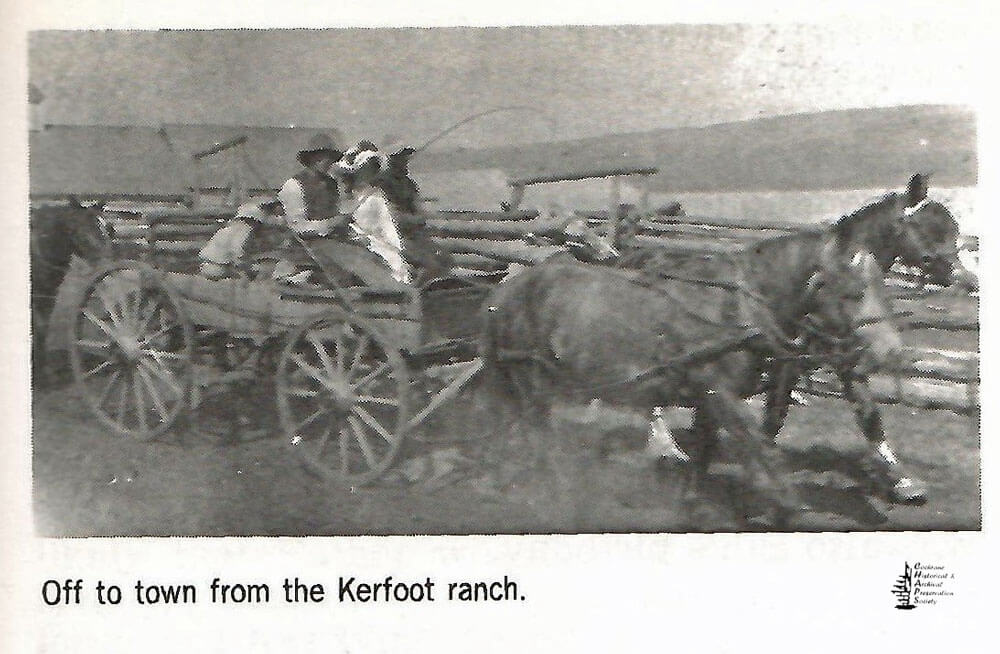
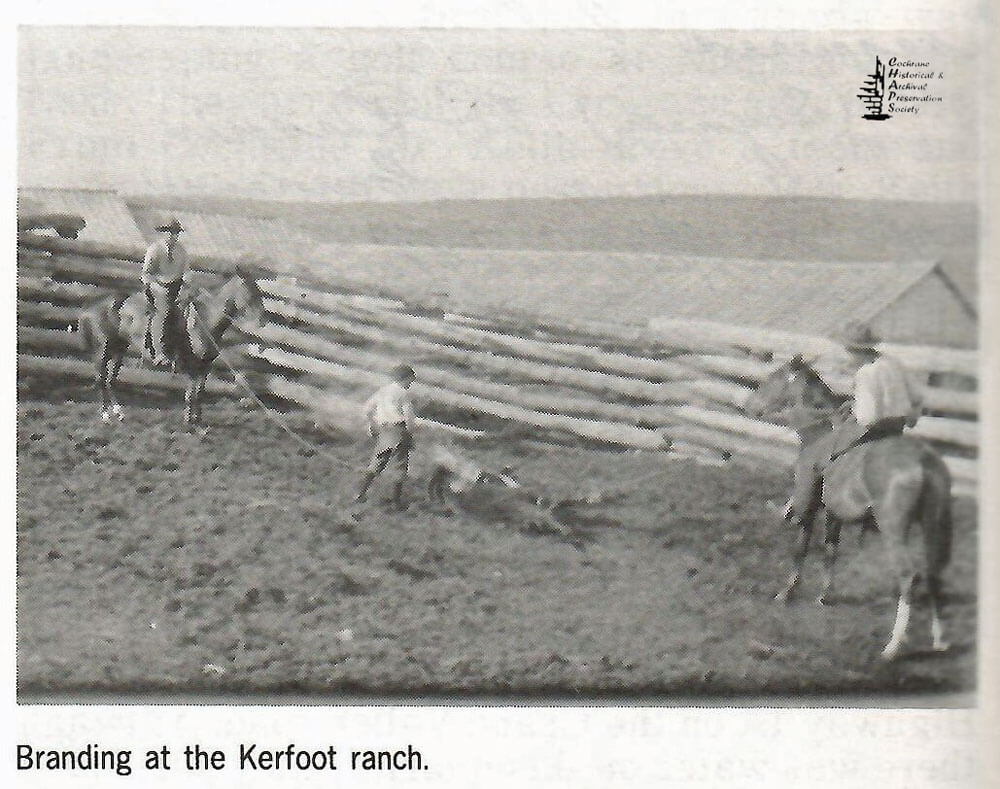
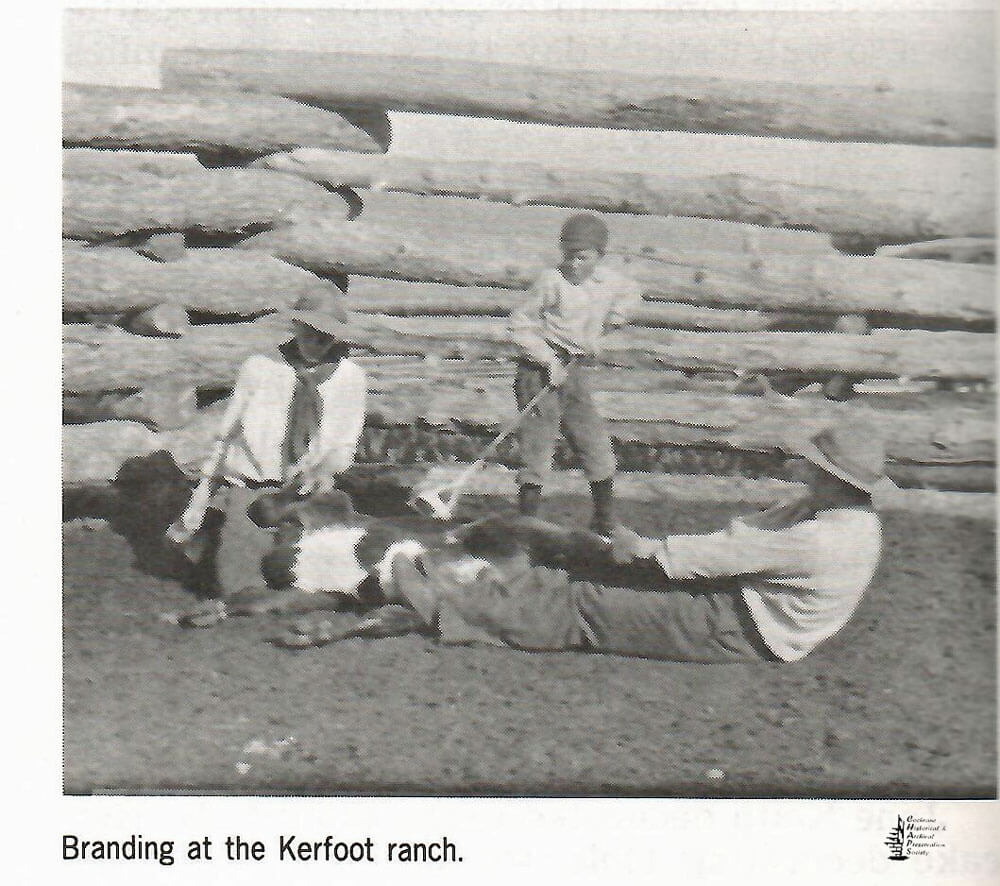
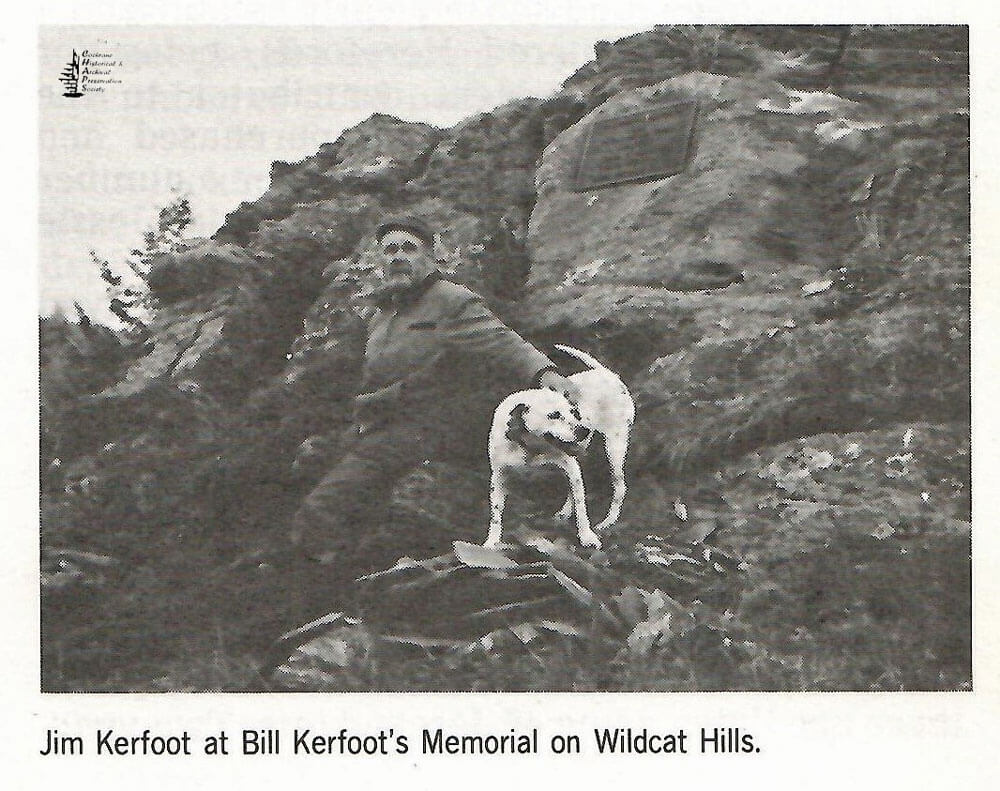
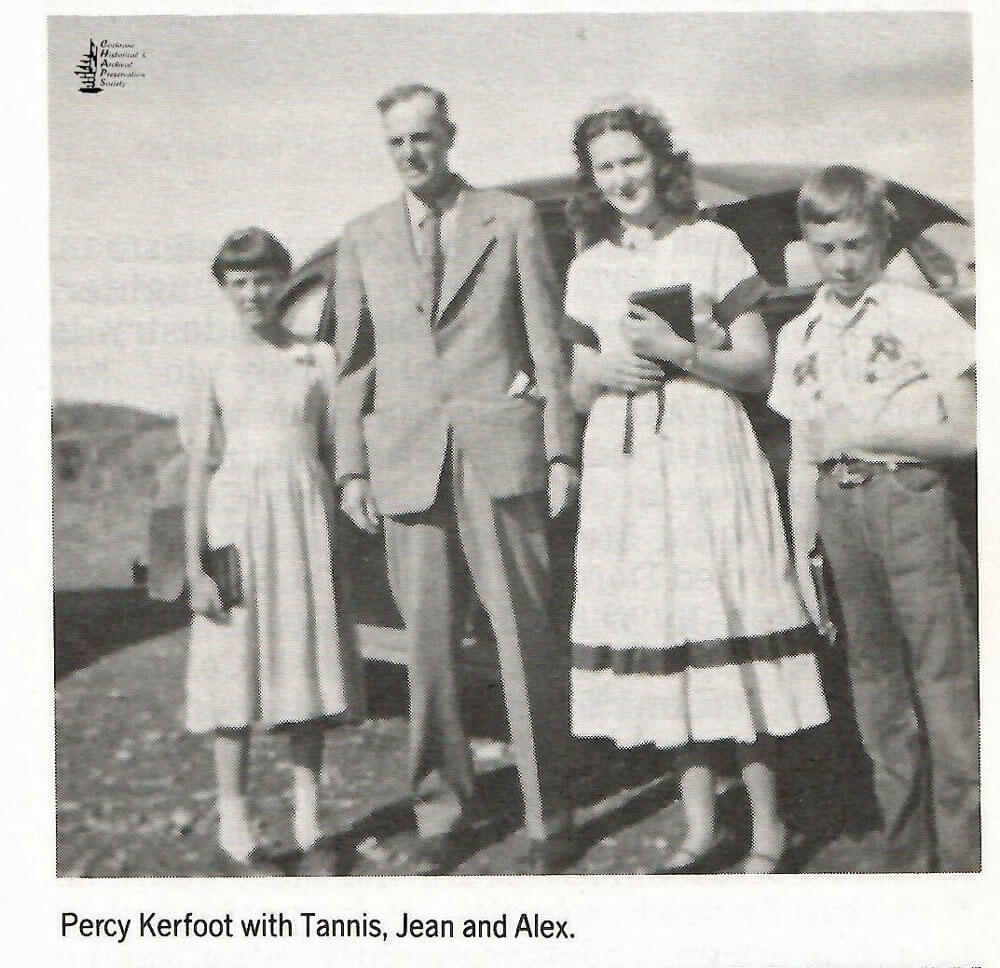
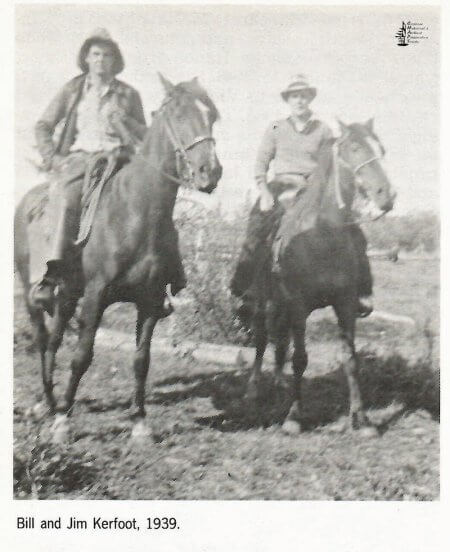
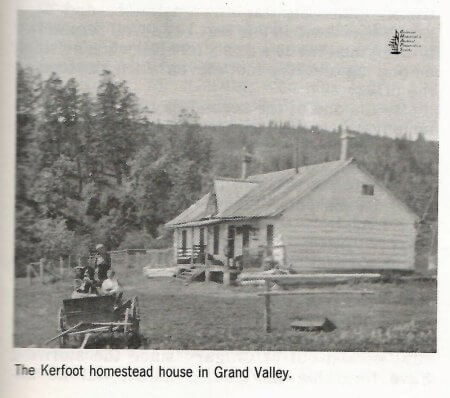
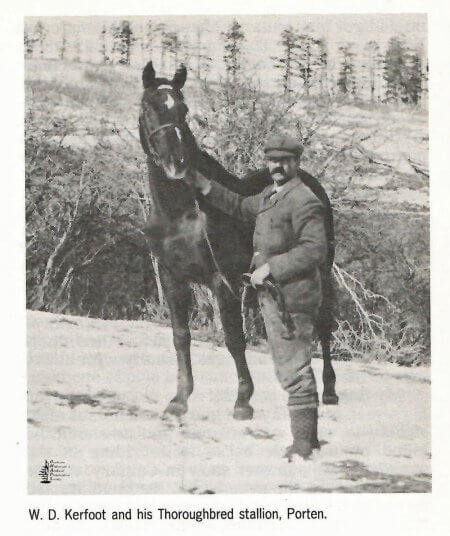

Frank (Francis) White was bookkeeper/treasurer of the Cochrane Ranche Co. from 1882-1884. He had worked for the Grand Trunk Pacific Railway in Quebec previously and married Christina Ross, with whom he had 3 children. Upon her death he came west, leaving his children in the care of her sister. He worked at Big Hill for a year, participated in the move south in 1883 and resigned at the end of 1884. He married my great grandfather’s sister Annie on Oct 20, 1885 and started the Merino Sheep Ranch south of the Bow River at Mitford. Annie was the daughter of Thomas Anderson, the first federal land and timber agent in Fort Edmonton. Frank’s diary contains many mentions of Kerfoot and is archived at the Glenbow Archives.